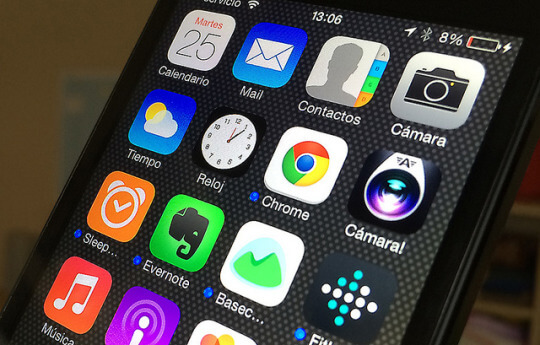
Image courtesy to Álvaro Ibáñez
Think back to the best conference you ever attended. Remember the feeling of walking through the doors, unsure of how the day would go, but excited? The first or second interaction you had after you walked through the door was likely with the program. You were either handed the program or picked it up off the table. As soon as you collected the rest of your swag, you greeted your friends, sat down, and looked through that program. Once you finished looking through the program, you still carried it with you throughout the event, referencing it for the rest of the day. Who was that speaker? What is served for lunch?
If it was a well-orchestrated event, they probably put as much care into their programs as they did the event. Now, tell us: Do you still have the program somewhere in your house or office? If you felt a connection to the event, you very well might.
Now, in the digital age, we can carry all of our coveted programs wherever we go: in our smartphones. Not only can attendees always access speaker bios, but also information on other attendees, and other career-enhancing information.
Now for the answer to the question at hand: Should you build your own event app? To be blunt: no. Not unless you have a dedicated app development team.
While at first, there may appear to be a bit of bias in our answer–we are an event app company afterall–our answer comes from years of experience in the event app and technology industry. Let us explain the reasons why you might want to rethink building your own event app:
It Takes Forever
Well, maybe not forever, but it might feel like that. According to Kinvey, it takes a skilled and talented app development team 18 weeks, or, about the time it would take you to drill three 3,000 foot oil wells. And this is with a team of front-end (the beautiful work users see in the app) and back-end developers (the beautiful work users don’t immediately see in the app), a project manager, user experience professionals, and people knowledgeable in how to get apps into the marketplace. Perhaps you and your team have better ways to use your time and money?
Mobile Development is Tough
There’s much more to an app than what you see in your phone. In order to accommodate all the interactions from multiple users that take place on the front-end of an app, there needs to be a strong back-end. While the back-end is invisible to the user, it’s essential for a strong app. Want to encourage live polling? Enable users to message each other? Send push notifications? Each of these interactions requires a strong back-end.
The back-end could and usually does consist of the storage and communication of data.
It’s important to think beyond what the user can see. Is this something that you have the resources to support?
Security is Important
To paraphrase Spiderman, with great data comes great responsibility. Since users are trusting you with their login information, their polling answers, and contacts, you have a responsibility to protect their data. Professional app development teams have the ability to do this, but if you’re working on this internally and don’t have the capacity to test and shore up your security, uploading your event to an already-existing event app might be the way to go.
You’ll Need Technical Support
In case you haven’t noticed, one of the buzzwords of 2015 is transformation. This is a pretty accurate word to sum up our times, considering the fact that everything seems to be constantly transforming. Especially technology. Transformation is fantastic and fun for users, but not so fun for developers as software needs to constantly keep up with changes. Let’s say you build your event app yourself, or bring on a team to build it for you. Because you’re such an organized event manager, you make sure that the app is completed 3 weeks out from the event to allow time for troubleshooting and pre-event adoption. Go you for being so on top of things! But then … there’s a new iOS released 4 days out from your event and some features of your event app aren’t compatible with the changes. Bugs pop up, and not the kind you can swat or fend off with bug spray. They’re the even more frustrating, digital kind that won’t leave without some serious work. Hopefully your development team can dig in and make the necessary changes. However, time is money. These problems can be avoided if you go with a pre-built event app.
User Experience is a Learned Art Form
User experience encompasses the user’s entire experience from downloading the app, to navigating through it, to interacting with it. The user experience will make or break your app. You coveted that printed program for years because of the user experience. Sure, it was a pretty lay out, but it also felt comfortable to move between the pages, fit nicely in your hands, and the order in which things were presented made sense. This is the basis for user experience. But it does get more complicated when you build a digital user experience.
Publishing and Distributing Apps is no Cake-Walk
There are people whose entire job is to understand the requirements of app stores like iTunes and Google Play. It’s a lot of work, but is a must in the app industry.
However, not everyone thinks so.
We’ve seen some companies attempt to circumnavigate the app store completely. The steps usually involved requiring users to text a long set of numbers or words to another long number, then receive a text back with a link to the website, encouraging them to save a shortcut to the website on their mobile app. You haven’t experienced frustration and audience confusion until you’ve tried to walk a room of 100 attendees through this process. This is not a smooth experience by any means.
Even more so than that printed event program, a great event app transcends your event and will be referenced for months to come. If all the above is possible or sounds like fun, building your own event app or paying a development team to develop the app might be the right choice for you. However, if building your event app doesn’t sound like something you want to do, you can always easily import your event into an already existing app, like Whova.
Have you ever tried to build your own event app? Share your thoughts on the experience below.
